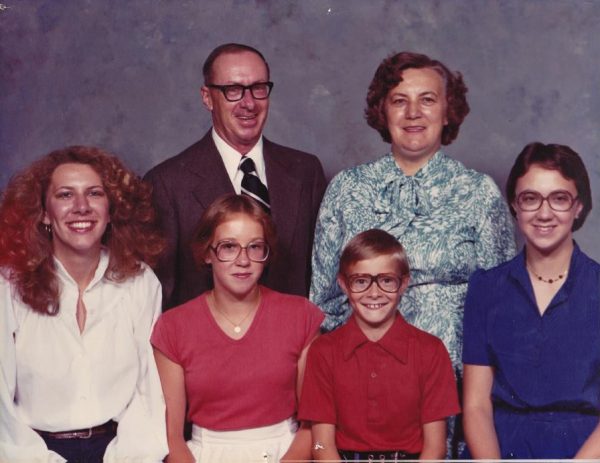
Left to right: [In white shirt–that’s me:] Gabriele Amersbach. My siblings left to right: Beatrix Greiner, Mark Greiner, Susanne Greiner. Parents: Hiram Greiner, Walburga Greiner.
When the Three Mile Island accident happened, I was in graduate school at Syracuse University in New York. My three much younger siblings were living with my parents in Lititz, PA. My mother had just had a major back operation and was recuperating in the hospital, unable to move.
When the accident occurred, I rushed home to be with my family. My first action was to pack everyone’s suitcase. My dad, a typical Lancaster County conservative, had much more faith in the government than I did and felt somehow they would fix things. I did not.
So, I did what any 23-year old would do.
At 23, I was horrified at how near we were to a total meltdown. I had always been environmentally aware and had already been concerned about the dangers of nuclear power as a teenager when I read about the long-term destructive potential of nuclear waste that had to be stored “safely” for decades. I felt our lives were at stake, and yet I couldn’t get my family to leave—especially since my mother couldn’t be moved.
So, I did what any 23-year old would do. I met friends in a bar in Lancaster the evening I came home. It was a strange night. We were all excessively exuberant. Everyone was laughing and drinking too much, and there was a heightened sense of gaiety in the room. As I was laughing with my friends, I remember thinking about The Masque of the Red Death, Edgar Allen Poe’s disturbing short story of a prince who locks himself into his castle with other wealthy nobles as the plague ravages the countryside.
We were celebrating, while death stalked us.
In defiance of the plague, the prince holds a masked ball for his privileged guests, who revel into the night, without a thought of the death and suffering around them. Yet a strange dark masked figure finds his way into the castle and joins the ball. Soon the revelers started succumbing to the plague. Death had found them, despite locked castle doors.
That was what I felt that night. We were celebrating, while death stalked us.
Eventually the crisis receded, and I returned to school. But years later, I am sure that the TMI accident is much more than a historical incident from long ago, and that its hazardous legacy continues to impact surrounding communities.
Having connections to the environmental community, I read individual reports of people who had experienced symptoms of acute radiation exposure, from nausea and vomiting to severe fatigue and hair loss. Citizen reporters noted an increase in thyroid conditions, cancer deaths, and long-term malformations in plant and animal life in surrounding fields and woods—reports that were suppressed or refuted by official sources.
TMI was a wake-up call for me.
TMI was a wake-up call for me. I started to develop the skepticism I have had numerous opportunities to develop more fully, that our government will not give us the whole truth—ever—and that dangerous industries, like nuclear power plants, have no interest or commitment to protecting surrounding communities without strong legislation.
And I am still chilled by the reality that a large part of Pennsylvania could have easily become America’s Chernobyl.
Gabriele
